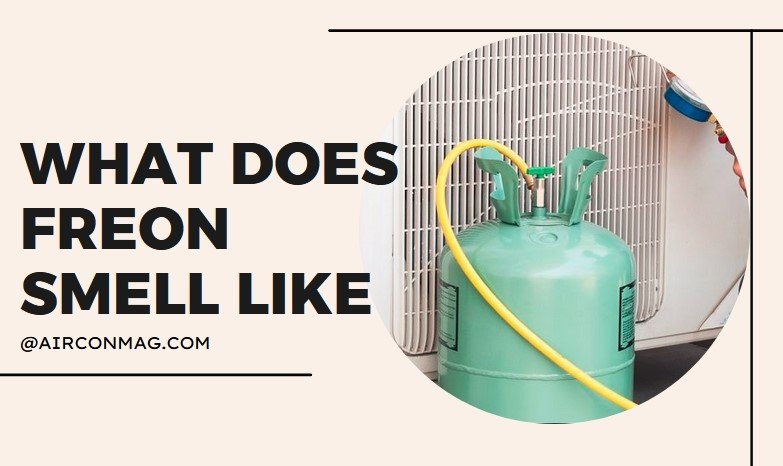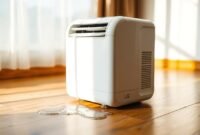Ever wondered about the scent in your air conditioning system? Freon might seem safe, but its smell can be risky. A sweet, chloroform-like smell means your cooling system might have big problems.
Knowing what freon smells like is more than just curiosity. It’s about keeping you and your home safe. If you smell refrigerant, it could mean a leak that needs fixing fast. I’ll show you how to spot these signs and why you should be careful.
Understanding Freon and Its Role in Air Conditioning Systems
Freon is key in many ac systems, helping cool our homes and offices. It’s a chemical that has changed how we control temperatures in the U.S.
Refrigeration is complex, and freon is a unique cooling agent. It absorbs heat from inside air and moves it outside, making our spaces comfortable.
Read also: Air Conditioner for a Basement Window

The Basic Chemistry of Refrigerants
Freon’s chemistry makes it special. Here are its main features:
- Molecular structure designed for heat absorption
- Low boiling point enabling rapid temperature changes
- Stable chemical composition
How Freon Operates in Your AC System
Freon goes through a cool cycle in your AC:
- Absorbs heat from indoor air
- Compresses and changes state
- Releases heat outside
- Returns to original state
Types of Modern Refrigerants
New refrigerants have replaced old freon:
| Refrigerant Type | Environmental Impact | Efficiency |
|---|---|---|
| R-22 (Traditional Freon) | High Ozone Depletion | Moderate |
| R-410A | Low Ozone Impact | High |
| R-32 | Minimal Environmental Risk | Very High |
Knowing about refrigerants helps us choose better cooling systems and care for our planet.
What Does Freon Smell Like: A Detailed Description
Exploring what freon smells like reveals a unique scent. It has a sweet, chloroform-like smell that’s hard to notice. Through my work with HVAC systems, I’ve learned this smell is both subtle and distinct.
The freon smell is often compared to sweet car coolant or a mild chemical scent. It’s important to know this smell can be tricky to spot. Freon is heavier than air, so it settles near the ground. This makes finding a leak hard for many homeowners.
- Sweet, chloroform-like scent
- Resembles car coolant
- Subtle chemical undertones
- Tends to sink to floor level
If you smell this unusual scent near your air conditioner or in small spaces, be careful. This smell could mean there’s a freon leak. Such leaks need quick help from a professional.
Not everyone can smell freon right away. Some might confuse it with other smells, while others might not notice it. Regular checks on your cooling system are key.
If you think there’s a freon leak because of the smell or other signs, don’t try to find or fix it yourself. Always call a certified HVAC expert. They can safely find and fix any refrigerant problems.
Common Signs of a Refrigerant Leak in Your Home
Finding a freon gas leak early can save you money and health risks. Your air conditioning system gives hints when refrigerant levels fall. This means you might smell an ac refrigerant odor or see a leak that needs quick action.
Knowing the signs of a refrigerant leak is key. It involves spotting clues in your cooling system.
Visible Signs of Leakage
Look for these signs to find a freon leak:
- Ice or frost on refrigerant lines
- Visible oil around AC connections
- Corrosion or damage on copper lines
- Water near your indoor AC unit
Changes in AC Performance
Performance changes can hint at refrigerant issues:
| Performance Symptom | Potential Refrigerant Leak Indication |
|---|---|
| Reduced cooling efficiency | Low refrigerant levels |
| Increased electricity bills | System working harder to cool |
| Longer cooling cycles | Insufficient refrigerant |
Physical Symptoms to Watch For
Your body might react to a freon gas leak:
- Unexplained headaches
- Dizziness or lightheadedness
- Mild respiratory irritation
- Nausea near AC units
If you see these signs, call an HVAC expert right away. They can check and fix any refrigerant leaks.
The Sweet Chemical Scent: Why Freon Has a Distinctive Odor

The freon odor is a unique experience. It comes from its complex chemical makeup. As a chlorofluorocarbon, Freon has a sweet smell that’s both interesting and dangerous.
This smell helps homeowners spot refrigerant leaks fast. It’s a key sign of trouble in cooling systems.
Chemical refrigerant smells aren’t random. Freon’s molecular structure makes it smell sweet and slightly ethereal. This smell is different from other chemicals. It warns of system problems.
- Sweet, mild chemical smell characteristic of Freon
- Slightly sugary undertones in the refrigerant aroma
- Distinct from other household chemical odors
When a leak happens in an air conditioner, the freon smell is clear. Homeowners should watch for this smell. It means there’s a problem that needs fixing right away.
Experts say any unusual chlorofluorocarbon smell is a big warning. Catching this smell early can stop bigger problems. It also keeps you safe from health risks from refrigerant.
Health Risks Associated with Freon Exposure
Freon gas leaks can be very dangerous. They can harm homeowners and people using the HVAC system. It’s important to know the risks of ac refrigerant odor to stay safe.
Immediate Health Effects
Freon gas leaks can cause quick health problems:
- Sudden dizziness and disorientation
- Intense headaches
- Nausea and vomiting
- Difficulty breathing
- Potential loss of consciousness
Long-term Health Concerns
Long-term exposure to freon can lead to serious health issues. These include:
- Respiratory system damage
- Potential neurological complications
- Heart rhythm irregularities
- Potential liver and kidney issues
When to Seek Medical Attention
Seek medical help right away if you experience these symptoms:
| Symptoms | Recommended Action |
|---|---|
| Severe breathing difficulties | Emergency room visit |
| Prolonged dizziness | Urgent medical consultation |
| Chest pain or heart palpitations | Immediate medical assessment |
| Loss of consciousness | Call 911 immediately |
Your health is the most important thing. If you think there’s a freon gas leak or feel strange after being near refrigerant, get medical help right away.
Identifying Different AC System Smells and Their Meanings
When your ac system starts emitting strange odors, it’s important to know what they mean. Different smells can point to various issues with your hvac system. These problems need to be fixed right away.
Let’s look at the most common odors you might find:
- Burning Smell: This could mean electrical problems or overheating parts. It might show worn-out wiring or a broken motor that needs a pro to check.
- Musty Odor: A sign of mold or mildew in your air conditioning system. This happens when moisture builds up in the ductwork or around the evaporator coil.
- Rotten Egg Smell: This smell might mean a dead animal in your ductwork. It could also point to a gas leak, which is a serious issue that needs quick help from a pro.
- Sweet Chemical Scent: This smell is often from a refrigerant leak. It means your ac system might not cool as well and needs a pro to look at it.
Read also: Air Conditioner Buzzing When Off
Spotting these smells early can stop big damage to your hvac system and keep your home’s air clean. If you keep smelling strong or weird odors, call a professional HVAC technician for a detailed check.
Remember, your nose can help you spot problems with your ac system. Don’t ignore strange smells – they’re often the first sign of trouble.
Steps to Take When You Suspect a Freon Leak
Discovering a freon gas leak in your ac system is alarming. Your safety and quick action are key. I’ll show you how to protect yourself and fix the issue.
Immediate Safety Measures
First, when you suspect a freon leak, your safety is most important. Here are the steps to take:
- Immediately ventilate the area by opening all windows
- Turn off your air conditioning system completely
- Evacuate the space if you notice any strong chemical odors
- Avoid direct contact with possible leak areas
Professional Intervention Strategy
Finding a freon leak source needs a pro. I suggest calling a certified HVAC technician. They can:
- Do a detailed leak detection assessment
- Do precise refrigerant leak testing
- Fix or replace damaged ac system parts
- Recharge the system with the right refrigerant
Quick action by a pro can stop health risks and damage to your cooling system. They have the right tools to find and fix leaks.
Don’t try to fix a freon leak yourself. It’s dangerous and can harm your ac system. Always choose safety and get expert help.
Prevention and Maintenance Tips for Your AC System

Keeping your AC system in top shape needs regular care. This care can stop expensive fixes and make your HVAC last longer. Here are some key tips to keep your air conditioning system healthy.
Air filters are key to your AC’s performance. Dirty filters can cause bad air and wear out your system. I suggest changing them every 90 days, or more often if you have pets or allergies.
- Check air filters monthly
- Clean outdoor AC unit regularly
- Keep vents and registers unblocked
- Schedule professional inspections annually
Be on the lookout for strange smells from your HVAC. Musty smells might mean mold, while burning smells could be electrical issues.
| Maintenance Task | Frequency | Benefits |
|---|---|---|
| Air Filter Replacement | Every 90 days | Improved air quality, system efficiency |
| Professional Inspection | Annually | Preventive maintenance, early problem detection |
| Outdoor Unit Cleaning | Seasonal | Prevents debris buildup, maintains performance |
By sticking to these maintenance tips, you’ll keep your AC system running well. This can also help you avoid costly repairs later on.
Legal Requirements and Environmental Impact of Freon
I’ve been watching how freon’s chemical properties affect our planet. The refrigeration world has changed a lot because of strict rules. These rules are aimed at reducing harm from chlorofluorocarbon scent.
In the U.S., there are big steps to stop using old refrigerants. The Clean Air Act helps control the use of ac refrigerant odor. It also encourages making greener alternatives. Freon (R-22) is being removed because it harms the ozone layer.
- Complete phase-out of R-22 refrigerant by 2030
- Mandatory transition to hydrofluorocarbon (HFC) alternatives
- Increased penalties for unauthorized refrigerant production
New refrigerants like R-410A are now safer for the environment. They work better and don’t harm the planet as much. People and businesses need to follow these new rules to protect our planet.
Understanding refrigerants’ environmental impact is key to fighting climate change. By supporting these changes, we help make our future greener.
Conclusion
Knowing what Freon smells like is key to keeping your home safe. The sweet chemical smell can signal a freon gas leak in your AC. Spotting these signs early can avoid health risks and costly damage to your AC.
Regular checks on your air conditioning system are vital. I suggest getting a professional inspection every year. This keeps your AC running well and safely. Experts can spot small issues before they get big.
If you notice strange smells or AC issues, act fast. Quick action can keep your family safe from freon dangers. If you think there’s a leak, open windows, stay away, and call HVAC experts to fix it.
Being informed and proactive helps keep your home comfy and safe. Your AC will stay in great shape too. Remember, knowing what to do and acting fast are your best defenses against freon risks.


